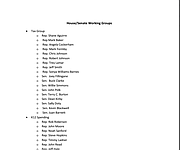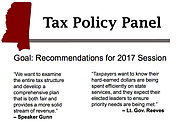House Speaker Philip Gunn (left) and Lt. Gov. Tate Reeves (right) announced nine working groups, composed of lawmakers, to look closely at state agency budget expenditures over the next few months. Photo by Imani Khayyam.
JACKSON — State leaders are continuing their march toward "fiscal responsibility," including the elimination of government spending of one-time money and implementing performance-based budgeting, as well as a serious look at state agency spending.
Lt. Gov. Tate Reeves and House Speaker Philip Gunn, R-Clinton, announced nine working groups, composed of lawmakers, to look at state agency budgets—particularly expenditures. The working groups are tasked with deciding what services state government should continue to pay for and to evaluate agency expenditures in order to weed out unnecessary spending.
"We want to get down to the details; we want to find out where the money is going," Gunn told lawmakers last week.
"I don't just want to know that $500,000 went to salaries—I want to know whose salary."
Gunn said the working groups will prioritize what government should be paying for within certain departments and agencies.
"Should we privatize some of those expenditures? Is this agency performing a function that could better be done by the private sector?" Gunn said at the Capitol last week.
Reeves, the lieutenant governor, said leadership wants to create more taxpayer revenue, by growing the economy and cutting taxes—not by increasing taxes.
"Our goal is not to create more taxes on those already paying their fair share but to create more taxpayers, and in creating more taxpayers, hopefully we are going to generate more revenue," Reeves told lawmakers last week.
Republican leaders have cut taxes around 50 times since they took control of the statehouse in 2012, Reeves said but he also stressed that they've also grown the economy.
"The size of our economy has grown significantly in the past five years," Reeves said. "Growing the economy leads to more income for individuals and more income for small businesses and more money for sales-tax collections."
Reeves sought to dispel what appeared in the press since the last legislative session about budget cuts.
"There have been a lot of state agency heads that have gone to the press, and the press has written stories I guess without verifying the numbers about these large cuts these agencies have taken over the last five years," Reeves said.
State agencies, like the Department of Mental Health and the Department of Health did take budget cuts from fiscal-year 2016 to fiscal-year 2017—and spoke to the Jackson Free Press, when asked, about those cuts.
However, Reeves' essential point was that state agency budgets have grown since 2012. Numbers from his office show that the Department of Transportation and Division of Medicaid have grown the most, at least in terms of state taxpayer support.
State leaders encouraged lawmakers to look at travel, commodities, personnel and contracting when considering where they could find efficient places to cut state budgets.
Gunn reiterated for lawmakers that they should not go into state agency budgets with the mindset that there's a lot of misspending.
"We're not on a witch hunt here, at least not yet, I don't want you to go in with the mindset that there's massive misspending, we're looking for misspending and we're looking for misappropriations," he told lawmakers.
"I think we can find some efficiencies but the goal is to make sure that the expenditures line up with our priorities."
Sen. Buck Clarke, R-Hollandale, who chairs the Senate Appropriations Committee, said lawmakers should dig into the budgets and ask questions every year. Clarke used the Division of Medicaid as an example, citing its 61-percent budget increase since 2012.
Clarke said that in a perfect world the state wouldn't need the division.
"If everyone in the state had an adequate salary and didn't even qualify for Medicaid, isn't that the goal we're trying to get to?" he told the groups last week. "So if we're increasing the Medicaid budget that much, where can we invest money to lower that and drive up the income (for Mississippians)?"
Clarke's vision is ideal, but eliminating any state agency jobs could be challenging to the state's economy. In fiscal-year 2016, state employees made $1.58 billion in salary and fringe benefits, Transparency Mississippi data show. "Government" jobs, which doesn't differentiate between federal, state or local, make up the highest percentage of nonfarm employment in the state at around 21 percent, Bureau of Labor statistics show.
The working groups will meet regularly until the next legislative session, when leaders hope they will be able to work their findings into budget talks. The bipartisan groups are composed of both senators and representatives. The nine working groups are broken down as follows:
• Department of Education
• Institutions of Higher Learning/Community Colleges
• Department of Corrections; Public Safety
• Medicaid
• Department of Human Services, Mental Health and Health
• Department of Transportation
• Boards/Commissions
• IT Consolidation
• State Buildings/Grounds/Property
Visit jfp.ms/state for more state news. Email state reporter Arielle Dreher at arielle@jacksonfreepress.com and follow her on Twitter @arielle_amara.





Comments
Use the comment form below to begin a discussion about this content.